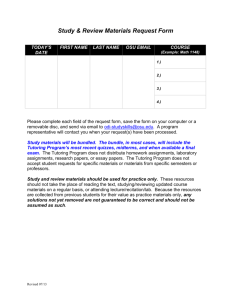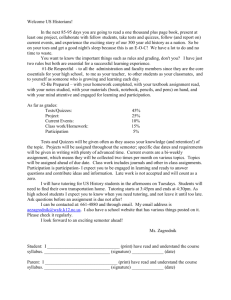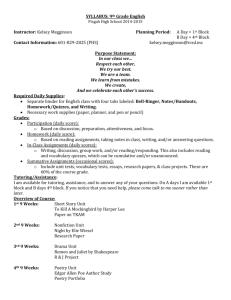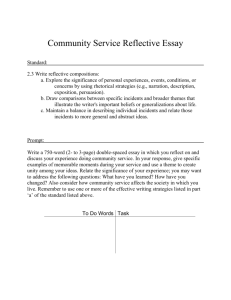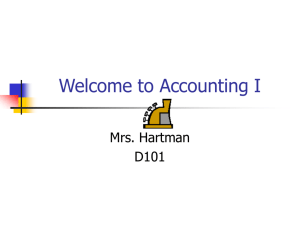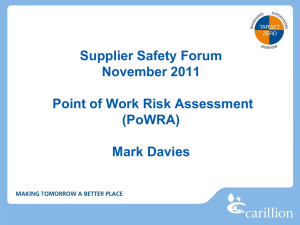Statistics Syllabus - frewm
advertisement
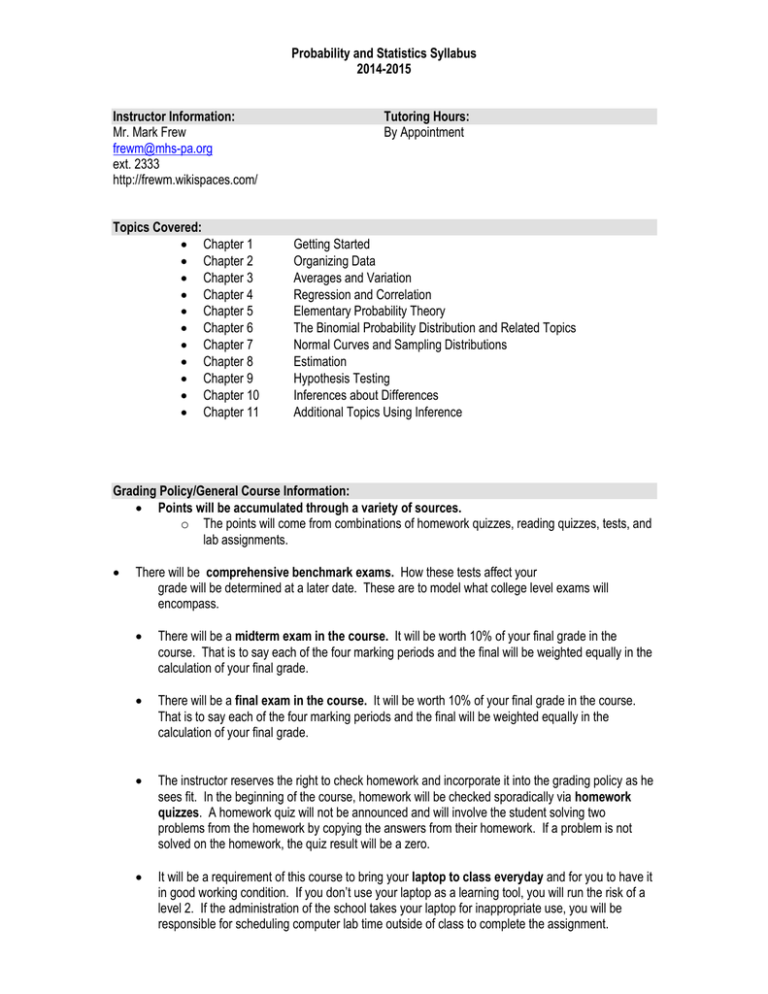
Probability and Statistics Syllabus 2014-2015 Instructor Information: Mr. Mark Frew frewm@mhs-pa.org ext. 2333 http://frewm.wikispaces.com/ Topics Covered: Chapter 1 Chapter 2 Chapter 3 Chapter 4 Chapter 5 Chapter 6 Chapter 7 Chapter 8 Chapter 9 Chapter 10 Chapter 11 Tutoring Hours: By Appointment Getting Started Organizing Data Averages and Variation Regression and Correlation Elementary Probability Theory The Binomial Probability Distribution and Related Topics Normal Curves and Sampling Distributions Estimation Hypothesis Testing Inferences about Differences Additional Topics Using Inference Grading Policy/General Course Information: Points will be accumulated through a variety of sources. o The points will come from combinations of homework quizzes, reading quizzes, tests, and lab assignments. There will be comprehensive benchmark exams. How these tests affect your grade will be determined at a later date. These are to model what college level exams will encompass. There will be a midterm exam in the course. It will be worth 10% of your final grade in the course. That is to say each of the four marking periods and the final will be weighted equally in the calculation of your final grade. There will be a final exam in the course. It will be worth 10% of your final grade in the course. That is to say each of the four marking periods and the final will be weighted equally in the calculation of your final grade. The instructor reserves the right to check homework and incorporate it into the grading policy as he sees fit. In the beginning of the course, homework will be checked sporadically via homework quizzes. A homework quiz will not be announced and will involve the student solving two problems from the homework by copying the answers from their homework. If a problem is not solved on the homework, the quiz result will be a zero. It will be a requirement of this course to bring your laptop to class everyday and for you to have it in good working condition. If you don’t use your laptop as a learning tool, you will run the risk of a level 2. If the administration of the school takes your laptop for inappropriate use, you will be responsible for scheduling computer lab time outside of class to complete the assignment. This class will be reading intensive. You will be required to read assignments for homework and be prepared to discuss them the next day in class. The instructor reserves the right to give reading quizzes and incorporate it into the chapter grade. It is your responsibility to complete homework. It is your opportunity to practice the skills learned in class that day, as this course is going to be taught as close as possible to what you will expect next year in college. Test problems follow closely to those assigned for homework. We will not discuss homework problems that were not attempted. With the exception of a stay in the health center, I expect you to hand in work the day it is due. College visits, medical/dental/psych appointments are a part of life here at MHS and it is an important life/work skill to budget your time wisely. Any work not handed in with the rest of the class, will be considered late and will be subject to the school’s late policy. (1 day late = 50% deduction, 2 days late = no credit possible although a “missing” score might be used in order to force completion of the project.) You will be expected to keep a notebook. It is highly recommended that you use a three-ring binder. Tutoring opportunities will only be extended to those who are working hard. It is not fair for those who are working hard in the class to have valuable tutoring time taken away by those who are “slacking”. Under no circumstances should electronic devices be used and/or visible unless used as part of an assignment. I will follow the school’s policy on this which is confiscation and discipline referrals. Retest Policy: As this is a college prep course, retests will rarely, if ever, be given. As they do not happen at the collegiate level, please do not expect them to happen here. Effort and Conduct Grades: Effort Grades o Lapses of Effort will be defined as (but not limited to) not-completing homework assignments, not participating in classroom discussions, sleeping in class, not scheduling tutoring appointments, not attending scheduled tutoring sessions, and not bringing necessary materials to class. A – less than two such incidents B - two to three incidents C – four incidents F – more than four such incidents Conduct Grades o Poor Conduct will be defined as (but not limited to) not paying attention, sleeping in class, refusal to participate in class, talking during instruction, off-task discussions during work sessions, inappropriate use of technology, the use of non-school related items (headphones, magazines, etc.), in addition to any acts that are in violation of the school’s discipline policy while within the classroom. A – less than two such incidents B - two to three incidents C – four incidents F – more than four such incidents The Student’s Responsibilities: Be ready and willing to learn. This means coming to class with necessary materials (pencils, calculator, notebook, homework, and laptop) and mentally prepared to participate in class. Statistics is not a spectator sport. There will be absolutely no electronics visible at any time. Seniors take note! Be here! Lateness will not be tolerated nor will restroom privilege abuse. Please use it before class or at the end. It is almost impossible for you to learn statistics without being in the classroom. If you miss class, it is your responsibility to make-up the work immediately. This is nonnegotiable. You should be prepared for your first day back with your make-up work done. Coming to class on the day after an absence and saying “What did we do last time?” will result in effort deductions. This is especially true as we meet every day. This is true for tests as well. Your computer is a learning tool. It should be respected and treated as such. There will be zero tolerance to non-academic computer usage. This includes, but is not limited to, email, internet surfing, music listening, video watching of any sort.
